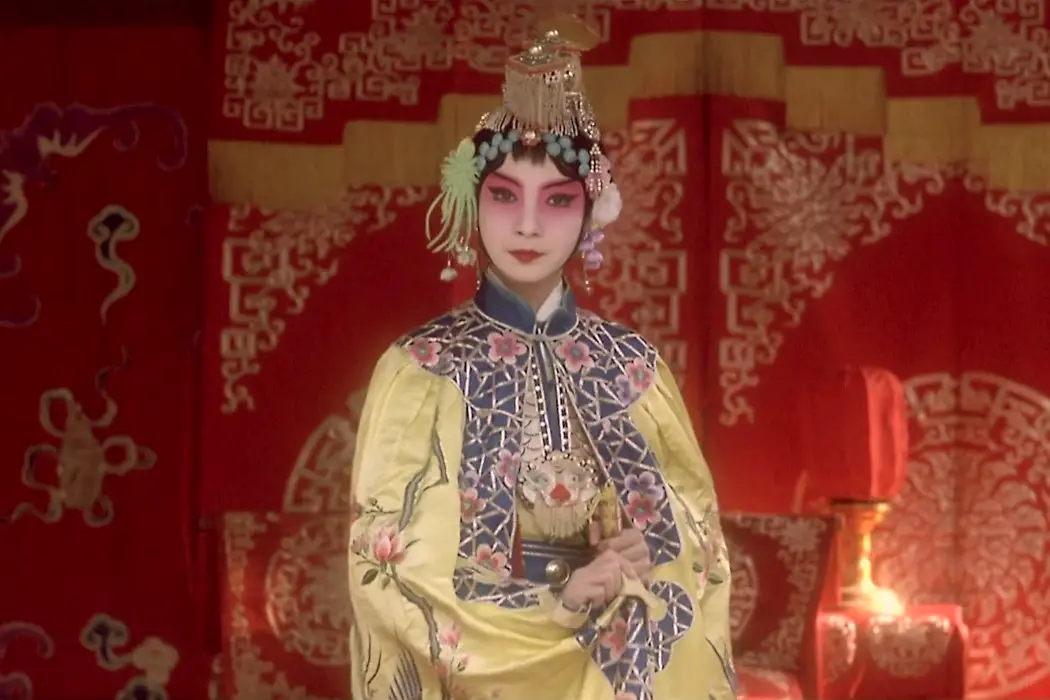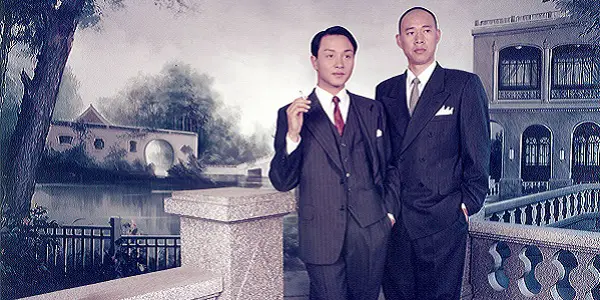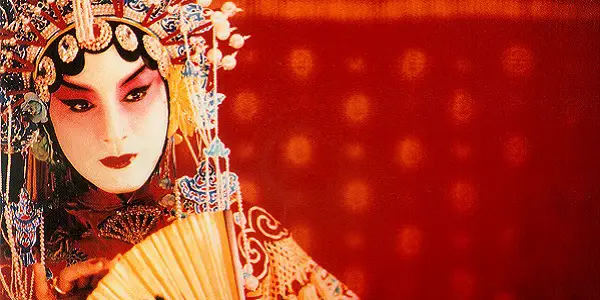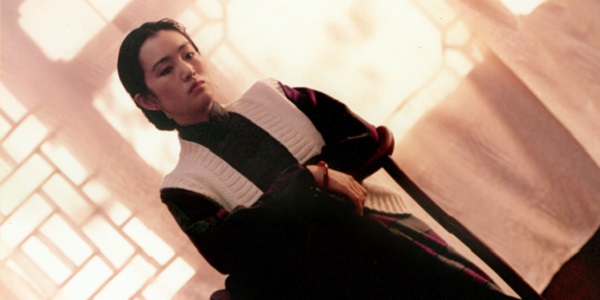FAREWELL MY CONCUBINE: The Legacy Of Leslie Cheung Lives On

Lee Jutton has directed short films starring a killer toaster,…
It has been twenty years since the tragic death of iconic actor and singer Leslie Cheung, yet every time I watch one of his movies, I find myself struggling to accept that he is really gone. To watch him perform is to be almost overwhelmed by his capacity for conveying intense, authentic emotion. Whether he’s portraying a disillusioned teen still grieving his deceased mother in Patrick Tam’s Nomad, the conflicted cop brother of a triad leader in John Woo’s A Better Tomorrow, or one-half of a fiery gay relationship in Wong Kar-wai’s Happy Together, it’s impossible to tear your eyes away from Cheung while he is on screen; deeply charismatic and undeniably beautiful, he commands your attention. But it’s hard to think of a role better suited to Cheung’s unique qualities as a performer than the queer Peking opera star he played in Chen Kaige’s epic drama Farewell My Concubine, which is being re-released in the form of a new 4K restoration of Chen’s original director’s cut for the film’s 30th anniversary.
The only Chinese-language film to ever win the Palme d’Or (it shared the honor with Jane Campion’s The Piano at the 1993 Cannes Film Festival), Farewell My Concubine chronicles the lives of two childhood friends who become acclaimed stars in the titular play. Covering fifty years in China’s turbulent twentieth century, it’s a sumptuous, tumultuous depiction of what happens when the lines between life and art irrevocably blur. It’s almost too easy to see this concept personified by Cheung, who identified as bisexual, took on many queer screen roles, and attracted attention for his gender-bending live performances; it’s hard to imagine an actor better suited to play Cheng Dieyi, a Peking opera star renowned for dan (female) roles who spends his entire life in unrequited love with his male co-star. Yet to view Farewell My Concubine only through this lens would be an overly simplistic interpretation of what is a complex tapestry of cultural, political, and personal upheaval.
Center Stage
In 1927, a little boy named Douzi witnesses the performance of an all-boys Peking opera troupe with his mother, a prostitute who wants to give him to the troupe; when she is told that Douzi’s vestigial sixth finger makes a career as a performer almost impossible, she simply chops it off and abandons him on the troupe’s doorstep. Under the strict mentorship of Master Guan (Lu Qi), Douzi is trained to specialize in female roles, yet his inability to correctly deliver the line “I am by nature a girl, not a boy” threatens to destroy his burgeoning career before it has even really begun. This line recurs throughout the film, showing how difficult it is for Douzi to separate his stage persona from his real life; even when brutally beaten as punishment for his errors, he cannot help but repeat, “I am by nature a boy, not a girl.”

Douzi develops a close friendship with Shitou, a young boy training for jing (male) roles in the troupe. As they reach adulthood, Douzi—now known as Cheng Dieyi—and Shitou—now known as Duan Xiaolou—become famous for their signature roles in Farewell My Concubine, in which Xiaolou (Zhang Fengyi) plays the male hero and Dieyi (Cheung) the female consort. But their professional and personal relationship is threatened when Xiaolou marries a spirited courtesan named Juxian (Gong Li), leading Dieyi to become deeply jealous and openly antagonistic. The three of them trudge onward into the heart of the twentieth century as years pass, wars rage, and governments rise and fall. Yet while Xiaolou and Juxian seem willing to evolve to survive the rapidly changing times, Dieyi remains devoted to the opera and its traditions as they were and as he believes they always shall be, adopting Master Guan’s harsh training methods as his own and driving his protege, Xiao Si (Lei Han) first to simmering resentment and then to open rebellion.
Peking Opera Blues
From the Second Sino-Japanese War through the Cultural Revolution and its aftermath, Farewell My Concubine portrays a China that is almost perpetually in flux, where violence and betrayal are not only the norm but necessary for survival. Throughout, the only constants in Dieyi’s life are his unrequited love for Xiaolou and his devotion to Peking opera; is it any wonder that he clings to both even in the face of torture and possible death? His entire identity, since boyhood, has been built around these two things, and yet Xiaolou’s impulsive marriage to Juxian instantly puts both in jeopardy. It’s no wonder that Dieyi cannot help but treat Juxian with disrespect and disdain, even though such behavior is guaranteed to hurt his relationship with Xiaolou.

Because Cheung was a Hong Kong native who had not previously acted in Mandarin, his dialogue in Farewell My Concubine is mostly dubbed by Beijing actor Yang Lixin. Yet that takes away nothing from what Cheung achieves with his remarkable performance, in which the most impactful moments are largely nonverbal. Each time someone hurts him one can almost see the pain rendered real on his face, as though the sword that his consort character uses to commit suicide at the end of the play has actually slashed him to the bone. That sword hovers over Dieyi throughout Farewell My Concubine, a symbol of the ties that bind him to Xiaolou as well as the tragedy that is almost guaranteed to befall them if they continue on together; Dieyi so fully identifies with his role as Xiaolou’s consort that it’s almost impossible to imagine him meeting any other end.
Yet just as Dieyi meets his match in the form of the headstrong Juxian, so Cheung meets his match onscreen in the form of the formidable Gong Li, whose beautifully complex performance shines so brightly that a lesser male co-star would be relegated to the shadows. (And indeed, while Zhang’s performance as Xiaolou is excellent, his character is the least showy of the three, making him the most likely to fade into the background when the trio of stars share a scene.) Already an international star when she took the role of Juxian, Gong has now reached icon status; watching Farewell My Concubine, it’s all too easy to see why. She’s uncommonly beautiful, yes, but also utterly lacking in vanity as an actress; as Juxian, she allows herself to be raw and full of rage. As a woman whose only value, as perceived by society, is her attractiveness to men, Juxian uses it to her advantage, seizing any and every opportunity to obtain a better life for herself. In her relationship with Xiaolou, she is the stronger one, and the more admirable for it; while she’s willing to give Xiaolou up for his own survival, telling Dieyi that if he helps her save Xiaolou from the Japanese she’ll leave them alone, Xiaolou is willing to sacrifice her just to save his own skin.

The new restoration of Farewell My Concubine not only restores the 20 minutes that were cut prior to the film’s original U.S. theatrical release (you can blame Miramax for that) but also looks positively spectacular. Gu Changwei’s cinematography evolves to portray the progression of time, from the harsh desaturation of Dieyi’s childhood through the lush, rich color that signifies the peak of his and Xiaolou’s stardom to the flat, no-frills depiction of life during the Cultural Revolution. The period details, especially the sets and costumes used during the Peking opera performances, are incredible and go a long way toward recreating life in a world long gone to dust. Watching these actors tell this story in this setting, the three-hour-running time just flies by—as it should in any epic drama worth your while. And when it ends, you’ll find yourself once again mourning the loss of Leslie Cheung and wondering what else could have been if severe depression had not taken such a toll.
Conclusion
As both a monumental piece of Chinese cinematic history and a lasting tribute to the special brilliance of its star, Farewell My Concubine is an essential viewing experience.
The new 4K restoration of Farewell My Concubine opens at Film Forum in New York on September 22, 2023 with additional markets to follow.
Watch Farewell My Concubine
Does content like this matter to you?
Become a Member and support film journalism. Unlock access to all of Film Inquiry`s great articles. Join a community of like-minded readers who are passionate about cinema - get access to our private members Network, give back to independent filmmakers, and more.
Lee Jutton has directed short films starring a killer toaster, a killer Christmas tree, and a not-killer leopard. Her writing has appeared in publications such as Film School Rejects, Bitch: A Feminist Response to Pop Culture, Bitch Flicks, TV Fanatic, and Just Press Play. When not watching, making, or writing about films, she can usually be found on Twitter obsessing over soccer, BTS, and her cat.













